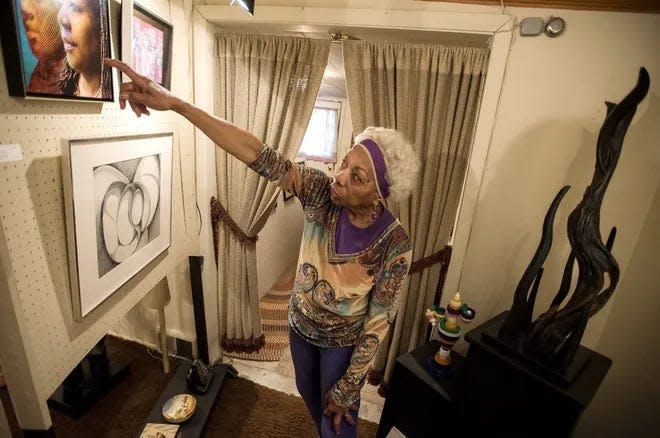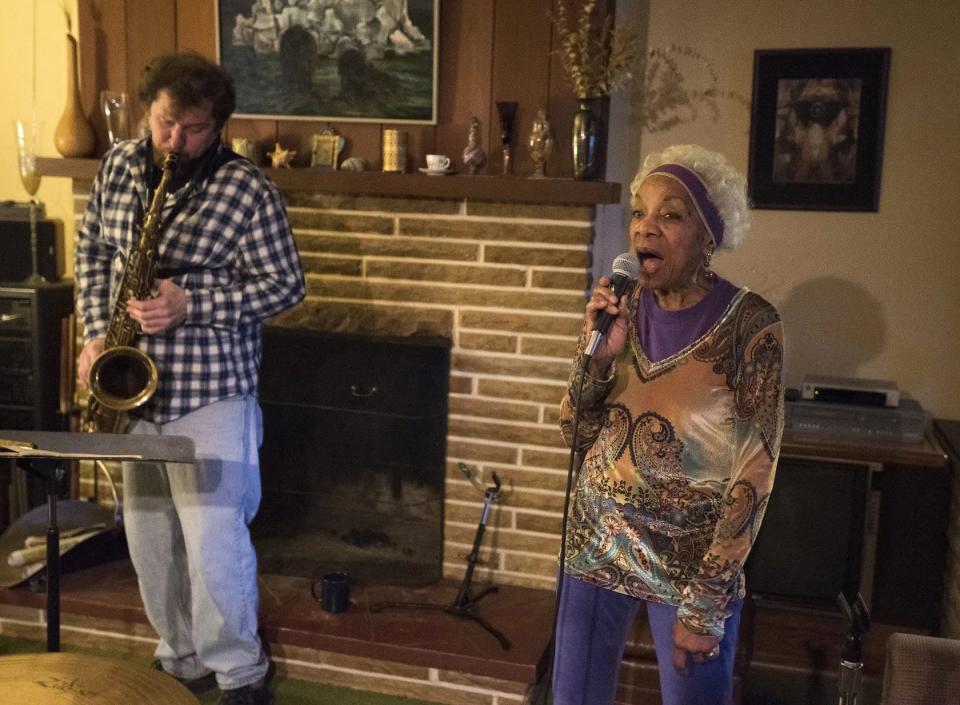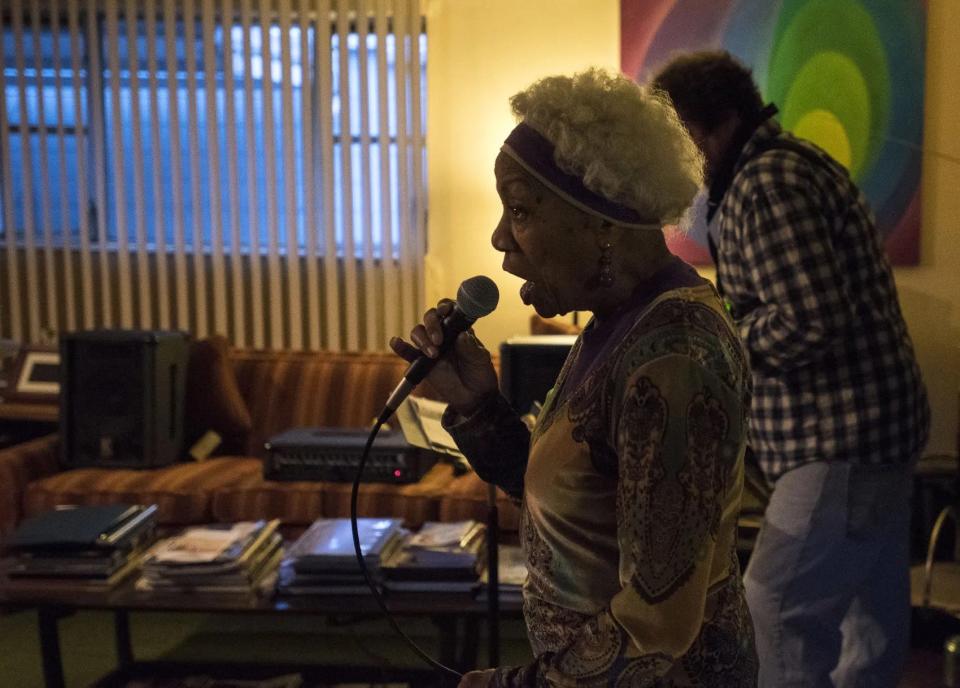Remembering Elizabeth 'Betty' Douglas, Beaver County's influential musical & visual artist
- Oops!Something went wrong.Please try again later.
She was Elizabeth when she painted, and Betty when she sang.
Whether creating an award-winning painting, or entertaining an enthralled audience of jazz fans, Elizabeth "Betty" Asche Douglas expressed herself with poetic elegance and compelling skill.
An eloquent writer and trailblazing student and educator, Douglas, a Rochester native, Beaver Falls High graduate and longtime Rochester Township resident, made a positive impact on the Beaver Valley and far beyond.
Friends are mourning the loss of an amazing woman after one of Douglas' daughters, Nanette Douglas Sykes, announced on Facebook this past weekend that her mother had died. Douglas was 92.
The William Murphy Funeral Home in Rochester is handling arrangements.
"She touched so many different generations and groups," said Tony Lang, a guitarist from Freedom, who regularly performed on stage with Douglas in recent years as she continued to sing at local clubs and bars into her 90s. "She was like Mr. Rogers. She made everyone she talked to feel special."
Retired as a professor of fine arts and humanities from Geneva College, Douglas operated the Douglas Art Gallery in Rochester Township, where for more than 30 years she created art pieces exhibited at prestigious galleries and art shows nationwide. She helped create and curate Sweetwater Center for The Arts' annual Mavuno Festival in Sewickley, fostering Black artists and dialogue.

"She did things in earnest," said close friend and professional jazz artist Rex Trimm, who regularly collaborated on stage with Douglas over the past few decades. "She never quit learning and challenged the living daylights out of her peers to do the same. I had the great fortune to be in her sphere. Although I was prepared for this loss, I am completely unable to process the passing of this giant. I posted our music on Soundcloud and I am proud to have some record of our time together."

Raised by parents who didn't graduate high school, but imparted a keen appreciation for the arts, Douglas began drawing before she was old enough to attend school, adding piano lessons at the age of 7. Gifted her first set of oil paints at age 10, she won her first of numerous arts awards as a third grader for a book poster contest sponsored by the Carnegie Library.
Her father was an electronics technician who serviced jukeboxes in various establishments, Douglas recalled in a 2017 video interview with The Times. "He would bring the old records off the jukeboxes, so we had all kinds of music in our house."
Douglas became a student and fan of jazz and blues music, and throughout her singing career enjoyed sharing with audiences the stories behind the influential songs she performed.
Using the stage name Betty, but signing her artworks as Elizabeth, she remained a multidisciplinary artist her whole life, not wishing to limit herself to one or two styles.
"I just keep doing what I feel like at the time," Douglas explained in her 2017 Times interview. "Usually I try to keep some sort of ties with what I'm doing with my visual art and musical art. It's my life. Quite simply, I don't know what I'd do without them. It's just as normal to me as eating or sleeping."
Douglas broke down barriers at age 16 as the first Black student enrolled in the Art Department at Carnegie Mellon University, two years behind Andy Warhol, or Andy Warhola as he was known then.
“I was in the same little gang of outsiders mentored by a couple of the youngest faculty members that he belonged to,” Douglas recalled in a profile interview with Carnegie Mellon's School of Art Alumni News
After graduating with honors in 1951, she expected to follow the common CMU Arts career path of department store advertising and display designing but was turned down in job interviews. To see what would happen, a white friend pretended to be Douglas and showed her portfolio to a downtown department store manager who promptly offered the white woman a job.
Momentarily discouraged, Douglas took a job at a Westinghouse factory and saved up money to attend graduate school at the University of Pittsburgh.
With a graduate degree in hand, she heeded a local minister's recommendation to apply for teaching positions at Black colleges in the South, procuring her first teaching job as a substitute for a professor on sabbatical at Southern University in Baton Rouge. Douglas befriended the Rev. T. J. Jemison, who helped organize the nation’s first successful bus boycott. and was introduced to Dr. Martin Luther King Jr. when he visited Baton Rouge to speak with Rev. Jemison about the event, which would inspire the groundbreaking bus boycott in Montgomery, Ala.
Douglas worked other temporary teaching positions at Black colleges, including Texas College, where she met her husband, Bill Douglas. After marrying, they moved to Fort Worth, where Douglas became a layout editor for Sepia magazine, a photojournalistic magazine profiling achievements by Blacks.
In her CMU Alumni news interview, Douglas recalled rising through the ranks quickly, becoming an editor for Jonathan Howard Griffin’s series of articles that would be turned into "Black Like Me," a book about racial segregation in the Jim Crow South and a key text of the 1960s Civil Rights movement.
Bill finished his master's degree in 1961, though the couple discovered jobs were scarce for them in Texas.
"So we loaded an old Peugeot with all our worldly goods and took off for Pennsylvania since my family was here," Douglas recalled in a 1974 profile in The Times.
Beaver County public schools were just getting integrated with their teaching staffs as Bill took a teaching job in the Rochester Area School District.
Douglas became the first Black teacher in the Beaver Area School District in 1964, and the first female Black professor at Geneva. where she helped develop the Interdisciplinary Humanities program.
She proudly raised three daughters, Andrea, Vicki and Nanette, and along with her husband opened the Douglas Art Gallery in 1974, retiring from teaching in the 1990s when her husband became terminally ill.
Her artworks were featured at the National Museum of Women in Washington, D.C., and the Uganda Christian University in Africa, as well as closer to home at the Three Rivers Arts Festival in Pittsburgh. She was the first artist to be featured in a one-person show at the Merrick Art Gallery in New Brighton and was a panelist at the 23rd annual National African American Women's Conference at the University of Kentucky.
She also kept busy, regularly giving guest lectures and performances at Geneva College, and singing jazz at church concerts, festivals, Pittsburgh clubs and Beaver Valley restaurants and taverns.

As recently as last month, she had a headlining gig scheduled for 37th Street Park in Beaver Falls.
A 2003 inductee into the Beaver Valley Musicians' Hall of Fame, she sang in recent years at Beaver County spots like Old Economy Village, the Fallout Shelter, Mario’s Dockside Grille, Wooly Bullys Juke-Joint, Lincoln Park and Long Branch Saloon. Last year, she was a featured entertainer at the Martin Luther King Jr. Community Day at Memorial Park in Rochester.
In 2016, Douglas received the Lifetime Service Award from the Rochester Chamber of Commerce during a banquet at Seven Oaks Country Club.
In his induction speech on her behalf, former Lincoln Park Performing Arts Center managing director Stephen Catanzarite said he's always had this image of Douglas' art studio and gallery complex "as a kind of anchor and spiritual center for the surrounding community," and described her as "without question one of the most accomplished people I know ― artist and educator, advocate and activist, scholar and singer, community leader and volunteer and lately, particularly through her use of social media, agent provocateur."
A multidisciplinary artist to the end, Douglas effectively communicated on social media, often posting eloquent Facebook messages crusading for social justice.
Her final Facebook post, July 7, decried gun violence in the wake of a Philadelphia mass shooting.
Many musician friends took to Facebook to share memories of what made Douglas so remarkable.
Elbie Yaworsky, founder of the Performing Arts Legends Museum in Ambridge recalled meeting Douglas at St. Stephen's Church in Sewickley in 1976 as members of the choir and music ministry.
"Her presence was felt as she sang with such a quality, range and passion," Yaworsky said. "I worked in downtown Pittsburgh when the August Wilson Center was being built. I was taken back when I saw a huge portrait of Betty Douglas on the building site along with August Wilson and many other African American artists from Pittsburgh. When I asked Betty about her presence at the construction site, she was very humble about the honor they bestowed upon her.
"We performed together with the Hopewell Community Big Band for several years and I would always be lifted by her amazing voice," Yaworsky said. "She sang at a concert in New Brighton and she made sure that the audience would understand the (borough's) significance in history with the Underground Railroad. Betty was always teaching."
Scott Tady is entertainment editor at The Times and easy to reach at stady@timesonline.com.
This article originally appeared on Beaver County Times: Remembering Elizabeth 'Betty' Douglas, a trailblazer and artist

